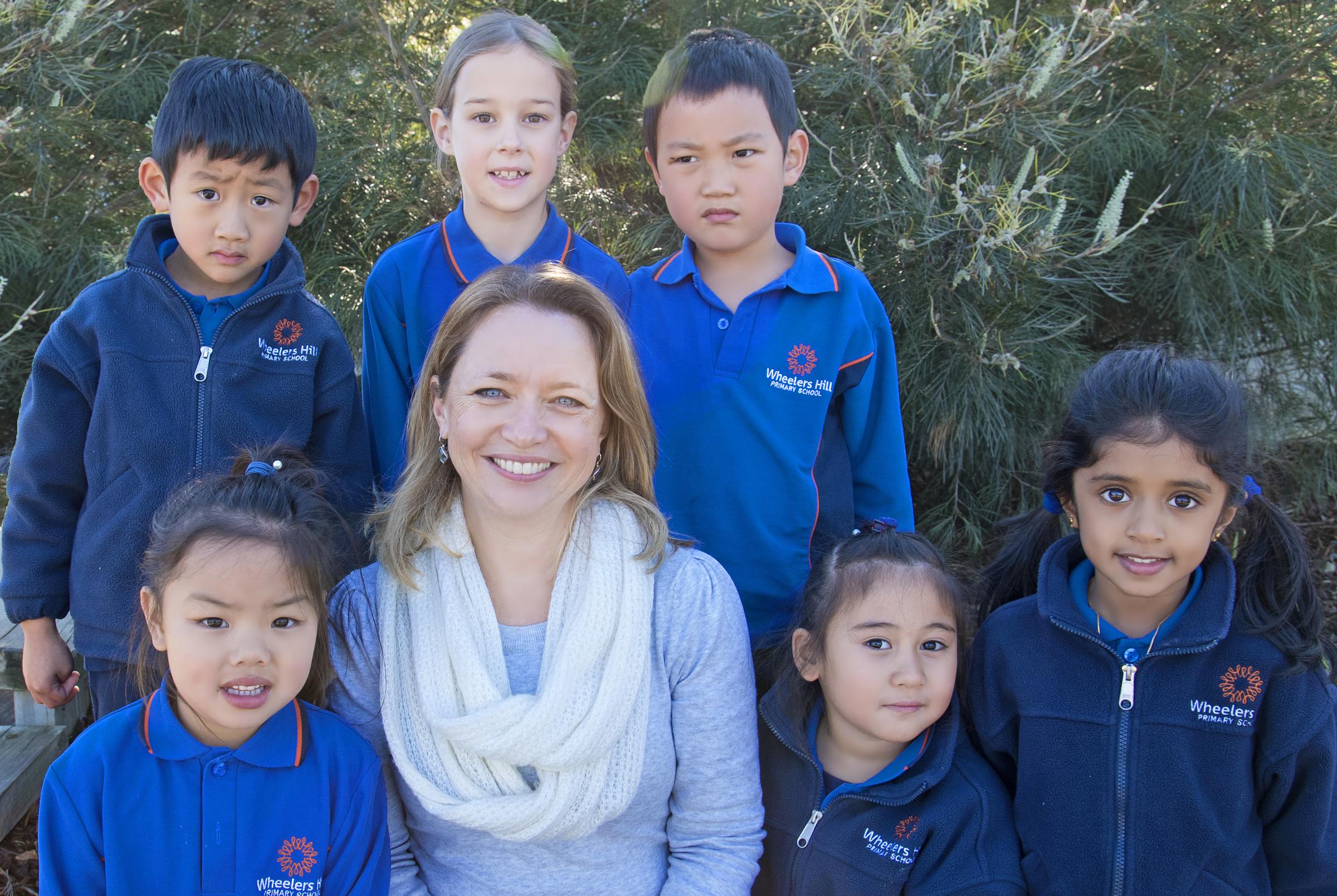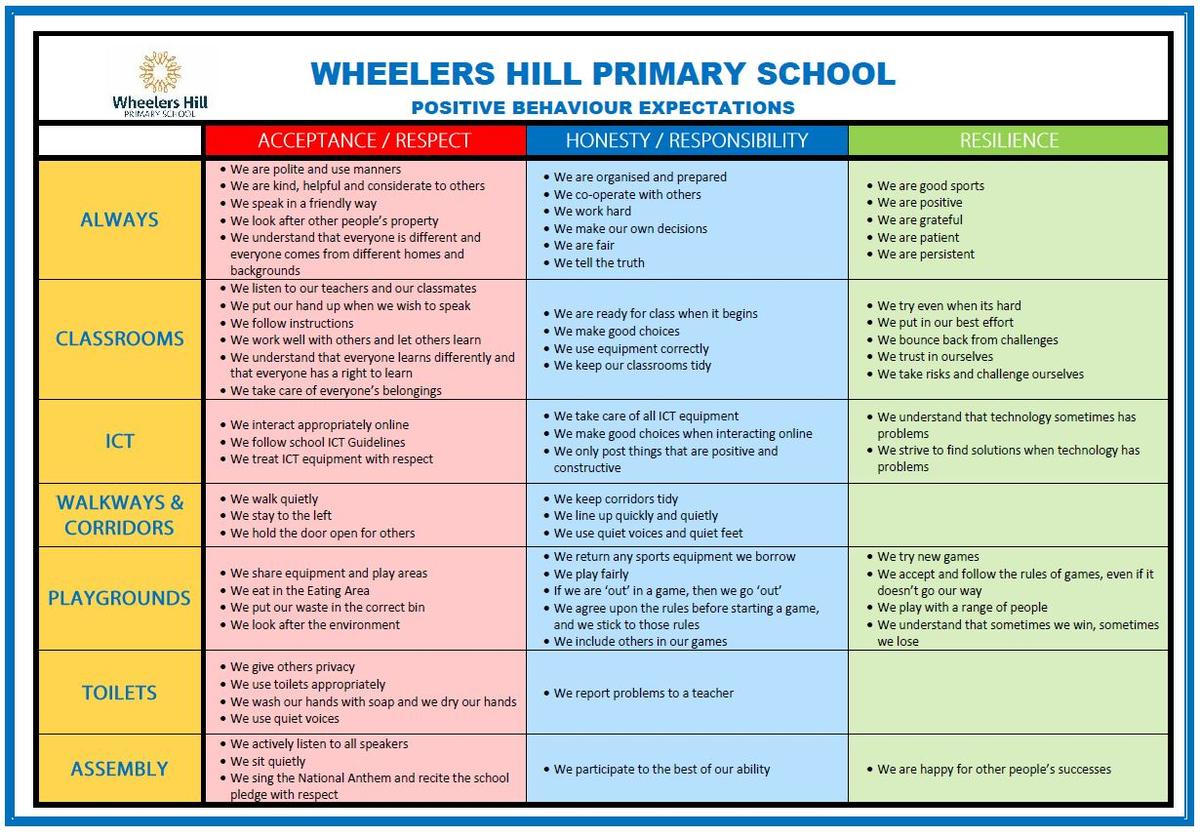Assistant Principal's Report Katrina Spicer - Wellbeing

21st February, 2020
SCHOOL-WIDE POSITIVE BEHAVIOUR SUPPORT (SWPBS)
At the beginning of this year, all students took a 'Student Code of Conduct' form home to be discussed and signed by parents and students. On the back of this form was the Positive Behaviour Expectations Matrix. This matrix is the core of our behaviour management here at Wheelers Hill Primary School. You may have seen this poster displayed in classrooms and in other areas around the school. The purpose of the matrix is for expected behaviours to be made very clear to the students. We have aligned these behaviours with our school values of Resilience, Respect, Responsibility, Acceptance and Honesty.
Teachers explicitly teach the students how we expect them to behave in all zones in the school.
Students are handed a coloured token when they are seen demonstrating one of our positive behaviour expectations. When a student has received a token, they place it in their own compartment in a box in the classroom. On Fridays, students use their tokens to vote for a whole school reward which will be received in the last week of term.
STUDENT SAFETY ON THE ROADS
As mentioned by Mr Ramsey in this newsletter, we have been consulting with Monash Council regarding the safety of our students on the roads around the school. We encourage parents to please follow the parking restrictions on Whites Lane and Threadbow Crescent, and remember that these restrictions are in place to maximise the safety of your children during the busy drop off and pick up times. Parents who have left their cars unattended in the 2 minute drop off zones may have received a reminder on their windscreen to please stay with your car. Parents who prefer to wait in their car for longer periods should not park in the the 2 minute zones.
If possible, you may consider walking to school rather than driving. Not only would this help to reduce congestion around the school, but there are many health benefits to walking:
Walking is good for children
- Walking is good for children's physical health. Regular physical activity builds and maintains healthy bones, muscles and joints.
- Walking is good for children's mental heath. Physical activity helps to reduce levels of stress, depression and anxiety ad can be a good social activity where children connect with their neighbours, become familiar with their surroundings and the community.
- Children that are active are more likely to continue healthy behaviours later in life.
Walking is good for schools
- Children who walk t school have been found to be more attentive and focused in class
- Children who walk to school will have a greater connection with their community.
- More children walking to school means less traffic congestion around the school and improved safety for the children.
Walking is good for the environment
- The environment also benefits because walking is a non-polluting and sustainable transport alternative.
Walking saves money!
- Finally, with the spiralling cost of petrol, walking also saves money!
Katrina Spicer
Assistant Principal - Wellbeing
PARENTING IDEAS ARTICLE
Managing Separation Anxiety at School Drop-Offs
By Michael Grose
Going to school for most children is a positive experience, however some children can struggle making the transition from their home environment to school. It’s naturally distressing to see your child upset at school drop-offs but there is a great deal you can do to make school drop-offs easier for you and your child.
Breaking the cycle of separation anxiety at school
A child’s clinginess, crying or tantrums at school drop-off can be disturbing for you as a parent. Despite putting on a brave face, you can feel guilty that somehow you’re the cause of this behaviour. Unless something traumatic has occurred then leaving your child at school is a normal part of life, something your child will get used to. The following strategies may help eradicate your child’s tars and fears when you take them to school:
Tell the story
Prepare your child thoroughly each morning for what will happen when you leave your child at school. Repeat the story each morning before school so they can fully prepare for drop-off.
It Takes Two
Involve your child’s teacher in the drop-off process as thy will be the person who must deal with an upset child. In extreme examples, at the start of term or after a long absence, a later starting time may give your child a chance to say goodbye in more relaxed circumstances.
Give Me Five
Rituals are both personal and reassuring so develop a special goodbye ritual that you consistently use when you leave your child each morning. Your special ritual may be simple such as a special wave or a kiss, or fun such as a high five, low five, fish pump bursting into a hand explosion. Then leave quickly without stalling or looking back. Avoid making leaving a bigger deal than what it is.
Reduce the Rush
Is your child a morning star or a night owl? Many children are slow starters in the morning, which can mean that they’re frequently rushed and arrive at school in highly anxious states. Do all you can to reduce morning stress, which may include earlier bed an waking times; laying out school clothes the previous evening and making minimal demands on their time.
This is the Place
Location carries memory so choose carefully the place you say goodbye to your child. If a kiss or hug at the school gate means a happy child, then you’ve probably found your goodbye place. Experiment with your goodbye location until you find one that works.
It’s Your Job
If goodbyes continue to cause tears, tantrums or clinginess consider, if possible, saying goodbye to your child at home and allowing another adult – your partner or another parent – to take your child to school.
If Separation Anxiety Continues
If your child’s separation anxiety interferes with their concentration and learning, prevents them from making friends, is excessive and goes longer than a month, consider getting professional support.
Separation anxiety left unchecked can lead to school refusal and other anxiety disorders later on.
For professional support, speak to your child’s teacher, Katrina Spicer (A.P. responsible for wellbeing), your GP or local council for suitable health care professionals in your area.

